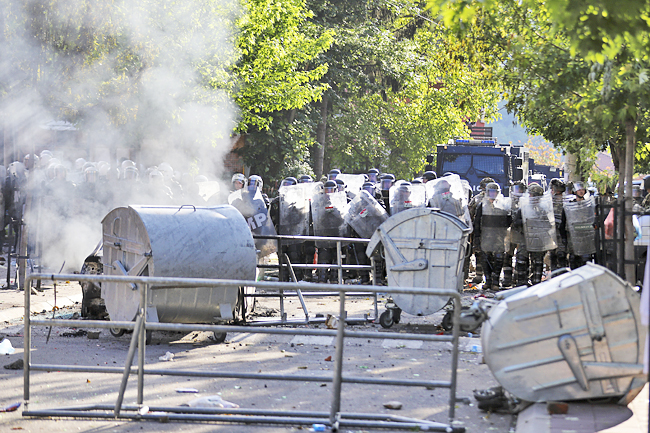PRISTINA, KOSOVO (AP) – The North Atlantic Treaty Organization (NATO)-led peacekeeping force in Kosovo, KFOR, yesterday raised the number of its troops injured in fierce clashes with ethnic Serbs to 30.
The Serbs had tried to take over the offices of one of the municipalities in northern Kosovo where ethnic Albanian mayors took up their posts last week.
A statement said that 11 Italian soldiers and 19 Hungarian ones “sustained multiple injuries, including fractures and burns from improvised explosive incendiary devices”. It added that three Hungarian soldiers were “wounded by the use of firearms,” but their injuries are not life-threatening. The Serbs clashed with NATO troops in the municipality of Zvecan, 45 kilometres north of the capital, Pristina.
“Both parties need to take full responsibility for what happened and prevent any further escalation, rather than hide behind false narratives,” said KFOR commander Major-General Angelo Michele Ristuccia.
Serbian President Aleksandar Vucic spent the night with his troops on the border with Kosovo. They were placed on the highest state of alert on his orders last week. Vucic said 52 Serbs were injured in the clashes, three seriously.

Kosovo police said four people were detained.
The violence was the latest incident as tensions soared over the past weekend when ethnic Serbs in northern Kosovo tried to block recently elected ethnic Albanian officials from entering municipal buildings. Kosovo police fired tear gas to disperse the crowd and let the new officials into the offices. Serbia put the country’s military on high alert and sent more troops to the border with Kosovo.
Kosovo and Serbia have been foes for decades, with Belgrade refusing to recognise Kosovo’s 2008 sovereignty.
The United States (US) and the European Union (EU) have stepped up efforts to help solve the Kosovo-Serbia dispute, fearing further instability in Europe as the war rages in Ukraine.
The EU has made it clear to both Serbia and Kosovo that they must normalise relations if they’re to make any progress toward joining the bloc.
Western ambassadors of the so-called Quint – France, Italy, Germany, the United Kingdom and US – met in Pristina with Prime Minister Albin Kurti, asking him to take steps to de-escalate and lower tensions, while strongly denouncing the Serbs’ violence against KFOR troops and journalists.
“Ultra-nationalistic Serb graffiti on NATO vehicles is a dark reminder in Kosovo We stand for peace and security,” said Kurti after the meeting. Quint ambassadors are to meet with Vucic, and he is also meeting with Russian and Chinese ambassadors to show he has support for his policies.
Ethnic Serbs in Zvecan, Leposavic, Zubin Potok and Mitrovica, four municipalities in the north, held elections last month that were largely boycotted by ethnic Serbs.



